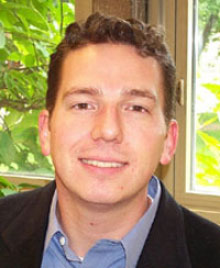
Kevin Kruse, associate professor of history at Princeton University.
Religious nationalism has emerged as a potent political force, mobilizing apathetic voters, redefining party platforms and shaping election results.
On Feb. 17, Kevin Kruse, associate professor of history at Princeton University, will deliver the back story on the rise of the religious right and the social movement's intersections with corporate America and matters of human rights, as part of Emory's J. Harvey Young Lecture in American History. The free event, "One Nation Under God: Corporate Interests, Christianity, and the Rise of Religious Nationalism in America," will be held at 6 p.m. in the Oxford Road Building's Presentation Room. The talk also will serve as the keynote address for the first-ever Atlanta Graduate Student Conference in U.S. History.
"It worked out wonderfully to combine the two events for the benefit of students, faculty and the broader Emory community," says Associate Professor of History Joseph Crespino, who will be introducing Kruse at the lecture.
The lecture is named for one of Emory's most beloved history professors, the late J. Harvey Young, a pioneer in the field of medical history. Young spent his entire career at Emory, rising from instructor in 1941 to become the Charles Howard Candler Professor of American Social History in 1980. After his retirement in 1984, family and friends endowed the annual lecture to honor Young's contributions; he attended the talks by prominent historians for many years until his death in 2006.
Integrating the lecture into the graduate student conference "would please Harvey enormously," says Samuel Candler Dobbs Professor of American History James Roark, who oversees the lecture series.
"He was so dedicated to graduate students," Roark adds.
The two-day conference on Feb. 17-18 is being organized by the Workshop in U.S. History, a group of graduate students from metro Atlanta who meet monthly to present papers and discuss topics in professional development. All conference events are free and open to the public, but participants are asked to pre-register at the Department of History website, where a full schedule will be available. The Young lecture does not require pre-registration. Funding for the conference was provided by the Graduate Council, History Department, Laney Graduate School, and the Manuscript, Archives, and Rare Book Library.
Kruse was selected for the keynote because he is considered a "rising star in the study of 20th century American history," says Crespino. Kruse also has local name recognition after publishing his first book, "White Flight: Atlanta and the Making of Modern Conservatism."
"We thought this was a wonderful opportunity to expand the scope of the Young lecture while attracting a larger audience to the conference," says Becky Thaler Sherman, a doctoral student in history who helped organize the conference.
Doctoral candidates will present cutting-edge research in fields as diverse as the history of the American South, religion, philosophy and women's studies, before soliciting feedback from faculty and audience members.
Topics include "Baptists and Manhood in the Maturing South," "Feminism, Gender Roles, and the Rise of Commercial Aviation in the United States during the 1920s-30s" and "Politics, Energy, and the Environment."
